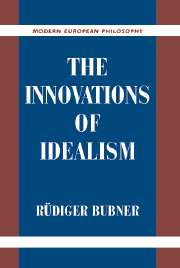Book contents
- Frontmatter
- Contents
- Foreword to the English Edition
- SYSTEM
- 1 Schelling's Discovery and Schleiermacher's Appropriation of Plato
- 2 Aristotle and Schelling on the Question of God
- 3 Hegel's Science of Logic: The Completion or Sublation of Metaphysics?
- 4 Hegel's Political Anthropology
- HISTORY
- AESTHETICS
- Index
2 - Aristotle and Schelling on the Question of God
from SYSTEM
Published online by Cambridge University Press: 06 August 2009
- Frontmatter
- Contents
- Foreword to the English Edition
- SYSTEM
- 1 Schelling's Discovery and Schleiermacher's Appropriation of Plato
- 2 Aristotle and Schelling on the Question of God
- 3 Hegel's Science of Logic: The Completion or Sublation of Metaphysics?
- 4 Hegel's Political Anthropology
- HISTORY
- AESTHETICS
- Index
Summary
It is generally acknowledged that the later Schelling, in the context of his untiring efforts to provide the final expression of his philosophy, developed a new reading of Aristotle to aid him precisely in this task. The long years of Schelling's withdrawal from prominent academic life were marked by a continuous struggle to articulate a philosophical position that could finally present itself as the consummation of his own intellectually productive beginnings. At the same time, success in this would also serve to curb the influence of his older rival Hegel, whom Schelling occasionally liked to characterise philosophically speaking as something of a ‘later arrival’. For in his final Berlin years, Hegel had effectively become the pre-eminent figure in German philosophy, and indeed retained this position at the summit of contemporary significance for some time even after his death when the Hegelian school had split into rival orthodox and progressive factions.
In this situation, Schelling was necessarily concerned to present Hegel's speculative dialectic, with its encyclopaedic exposition of spirit, essentially as an extreme and one-sided development of the systematic philosophical discoveries that Schelling had made in his early years. In Schelling's eyes, therefore, Hegel had come up against the intrinsic limits of the original idealist approach without being able to overcome them himself. From the perspective of his mature philosophy, the later Schelling classified Hegel's position as that of a ‘negative philosophy’ that would need to be succeeded by a new ‘positive philosophy’.
- Type
- Chapter
- Information
- The Innovations of Idealism , pp. 47 - 59Publisher: Cambridge University PressPrint publication year: 2003



